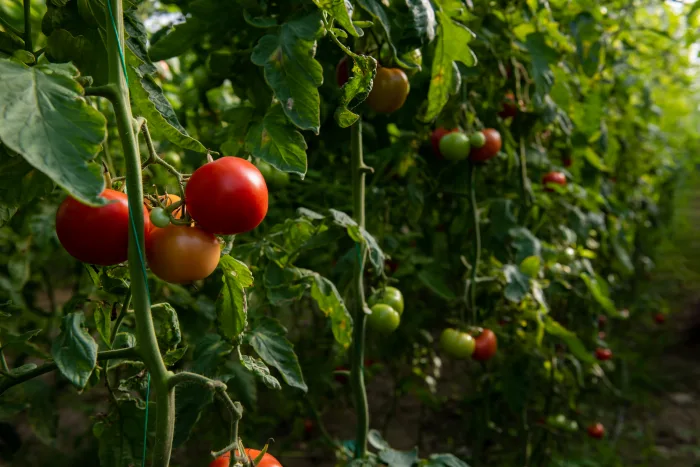Epsom salt is a gardening secret that many seasoned gardeners swear by. It’s a simple, affordable solution that can help enhance plant health, promote growth, and address common issues like nutrient deficiencies. However, it’s important to know how and when to use Epsom salt, as not every plant benefits from it.
In this guide, we’ll explore the benefits of Epsom salt, the plants that thrive with its use, and how to apply it effectively to your garden.
What is Epsom Salt?
Epsom salt, chemically known as magnesium sulfate, is a naturally occurring compound made up of magnesium, sulfur, and oxygen. It is different from table salt and is a valuable supplement for plant growth. Epsom salt’s main appeal lies in its high magnesium content, which is crucial for plant health.
Magnesium plays a vital role in chlorophyll production, allowing plants to photosynthesize more effectively. Sulfur helps plants form proteins, amino acids, and enzymes, promoting overall growth. Epsom salt has been a trusted tool in gardening for many years because it’s easy to use and affordable.
Benefits of Epsom Salt for Plants
The primary benefit of Epsom salt is its ability to provide magnesium to plants, an essential nutrient that supports many plant functions. Without enough magnesium, plants may show signs of distress, such as yellowing leaves or slow growth.
Epsom salt helps plants utilize sunlight better by enhancing chlorophyll production. It also aids in nutrient absorption, especially nitrogen and phosphorus, which are vital for healthy plant growth. Regular application can lead to stronger plants, more vibrant blooms, and better seed germination.
When Should You Use Epsom Salt?
It’s important to know when to apply Epsom salt to see the best results. Signs that your plants may benefit from magnesium include yellowing leaves, particularly between the veins, and slow growth. If your plants are showing these signs, it’s time to introduce Epsom salt.
Epsom salt is especially beneficial for certain plants, including tomatoes, peppers, and roses, which require extra magnesium for optimal growth. Applying it early in the growing season can kickstart plant health, and ongoing use throughout the season can address any signs of stress.
Plants That Benefit from Epsom Salt
Vegetables
Epsom salt is a great addition to vegetable gardens, particularly for crops like tomatoes, peppers, and beans. These plants thrive when given extra magnesium, which helps boost growth and fruit production. Epsom salt can also help prevent blossom-end rot in tomatoes by balancing nutrient levels.
Flowers
Roses, in particular, respond well to Epsom salt. It encourages vibrant blooms and promotes healthier foliage. Other flowering plants that need extra magnesium can also benefit from periodic applications.
Fruit Trees
Fruit trees, such as apples and citrus, often become sweeter and juicier when treated with Epsom salt. It enhances their ability to take up nutrients, leading to better overall fruit production.
Plants That Should Avoid Epsom Salt
While many plants benefit from Epsom salt, it’s not suitable for all. Some plants, especially succulents and cacti, thrive in nutrient-poor soil and do not require additional magnesium. Adding Epsom salt to these plants can disrupt their natural nutrient balance and even cause root damage.
Herbs like sage, thyme, and oregano prefer leaner soils, so too much magnesium can affect their flavor and essential oil production. Root vegetables, such as carrots and radishes, may also suffer from excessive magnesium, which can interfere with nutrient absorption and hinder root growth.
How to Apply Epsom Salt to Plants
The best way to use Epsom salt is to dissolve it in water, ensuring the nutrients are evenly distributed. Never sprinkle it directly onto plants as this can cause harm. For general use, mix about one tablespoon of Epsom salt with a gallon of water. This mixture can be used to water plants or sprayed directly on leaves for quicker absorption.
For potted plants, use a lower concentration of Epsom salt to avoid burning the roots. Applying the solution to the soil ensures the magnesium is absorbed by the plant’s roots over time.
Can Epsom Salt Help with Weeds?
While Epsom salt may have some effect on weeds, it’s not a reliable or recommended herbicide. Using it as a weed killer can throw off the nutrient balance in the soil, negatively affecting your plants. It’s best to focus on using Epsom salt for plant health and growth, not as a weed solution.
Epsom salt is a powerful tool in any gardener’s arsenal. By providing magnesium and sulfur, it helps plants grow stronger, produce vibrant blooms, and yield more fruit. However, it’s important to use it correctly and not apply it to plants that don’t need it. When used properly, Epsom salt can boost the health of your garden and lead to a more successful growing season.

